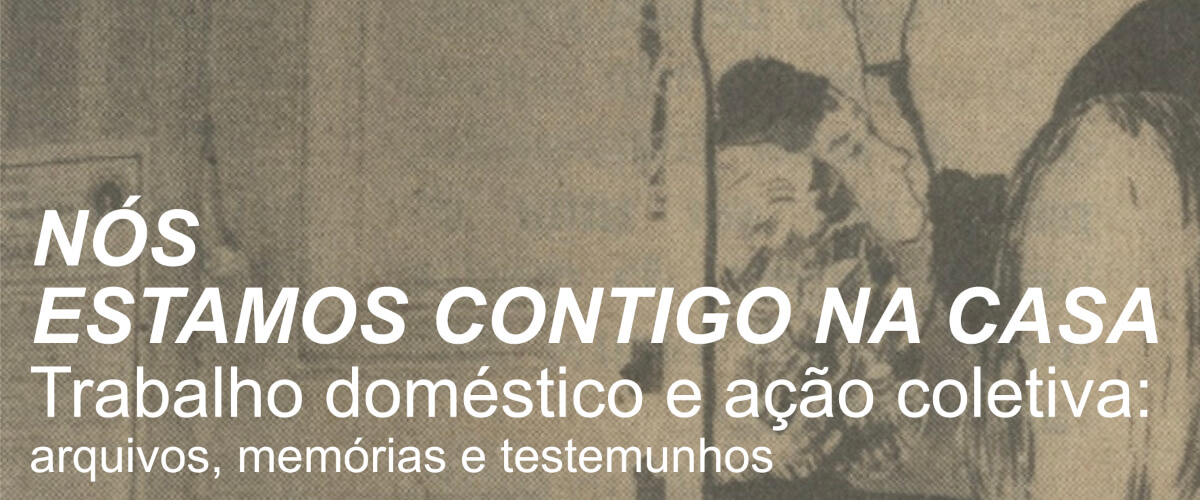fevereiro, 2026

Detalhes do Evento
This meeting seeks to encourage the participation and sharing of ideas calling on the voice of workers and the power of archives as a living tool for knowledge. We
Ver mais
Detalhes do Evento
This meeting seeks to encourage the participation and sharing of ideas calling on the voice of workers and the power of archives as a living tool for knowledge.
We are with you at home
Domestic work and collective action — Archives, memories, testimonies
In recent decades, the formation of a global economy of care and domestic services has become one of the central elements in understanding the transformations of work in capitalist societies (Ehrenreich and Hochschild, 2002; Lutz, 2011). This process of “international division of reproductive labour” (Parreñas, 2001; Anderson, 2007) is an example of how historical inequalities have been reconfigured and deepened in the transition from colonial to postcolonial contexts (Cox, 2006; Sartri, 2008). The absence of public care policies, combined with labour market deregulation and labour shortages in the sector, has produced a scenario of labour and social precariousness in which gender, ethnicity and class intersect. Employers’ preference for migrant workers—often without residence permits—has allowed the formation of a new servile class, characterised by fragile ties, an almost complete absence of rights and low wages (Giordano, 2022).
This context of structural vulnerability fuels the idea that domestic and care work is marked by social invisibility and a supposed inability to mobilise collectively. However, this interpretation tends to obscure the long history of resistance and organisational experiences led by these workers. Since the 19th century, multiple examples of labour demands and struggles against oppressive practices demonstrate that the sector, far from being disorganised, has been the scene of various forms of mobilisation for better working conditions (Anderson, 2001; Boris and Nadassen, 2008; Gutiérrez-Rodríguez, 2010). To recover and reflect on this historical trajectory is not only an exercise of remembrance, but a necessary step to reinscribe domestic and care work in the global history of labour struggles, challenging narratives that seek to naturalise its subalternity.
DOMESTIC AND ARCHIVAL WORK
The title of this meeting is taken from a letter sent by a domestic worker to her union, kept in an archive, with no date, no sender or recipient, only a handwritten note: archive. It reads: ‘And never think you are alone, we are with you in the house where we work.’
We took inspiration for this meeting from this short excerpt, part of a text that describes, in the first person, the early migration to the city of Lisbon to work in someone else’s home at the age of seven.
Work on the archives of women workers’ organisations and the increased focus on trade unionism in the domestic service sector has received growing attention in recent years, throughout the world, partly driven by a renewed interest in the intersection of gender, class and migration inequalities in the sphere of paid domestic work. At this meeting, which will take place on 6 and 7 February 2026 in Lisbon, we are opening a space for, based on the project A Voz das Trabalhadoras (The Voice of Women Workers: The Archives of the Domestic Service Union [1974-1992]), to gather contributions from different geographical areas and fields of practice that intersect around domestic work, care and cleaning — and their articulation with forms of collective action, cooperativism, trade unionism, and memory construction.
Thus, with immersion in trade union archives and experiences of self-management and cooperativism in domestic service as our main starting point, we invite submissions of proposals that focus on the various repertoires of organisation and struggle adopted by workers in this sector/activity, focusing on oral history or archival research, the narration of experiences and self-representations of working conditions and contexts.
A TRANSNATIONAL AND INTERDISCIPLINARY DIALOGUE
Seeking to establish a transnational and interdisciplinary dialogue on these experiences, contributions are welcome in the following areas:
- Archival practices of/on domestic work;
- Migratory flows, citizenship, gender, and racialisation in domestic, cleaning, and care work;
- Collective action, cooperativism, and trade unionism in domestic work.
This meeting seeks to encourage the participation and sharing of ideas among activists, artists, researchers, workers and trade unions — calling on the voice of workers and the power of archives as a living tool for knowledge, learning and transformation.
Call for papers
We therefore invite proposals from different disciplinary fields and with different methodological approaches, welcoming the intersection of perspectives. The Meeting welcomes proposals from:
a) artists (performance, theatre, audiovisual);
b) researchers, archivists, activists and students;
c) domestic and care workers (collectives, cooperatives, trade unions)
Who, where, how?
Send short abstracts (max. 500 words) with a brief biography by 10 November 2025. Submissions to: encontro.trabalhodomestico2026@gmail.com.
Accepted languages: Portuguese, Spanish, English.
Venues: NOVA FCSH, Cape Verde Cultural Centre (Lisbon)
Organisation: CICS.NOVA and IHC
>> Download the call for papers (PDF) <<
Organising Committee
Ackssana Silva
Elsa Nogueira
Inês Brasão
José Soeiro
Mafalda Araújo
Nuno Ferreira Dias
Tempo
fevereiro 6 (Sexta-feira) - 7 (Sábado)
Localização
Lisbon, Portugal
Organizador
Institute of Contemporary History and CICS.NOVA — NOVA School of Social Sciences and Humanities

